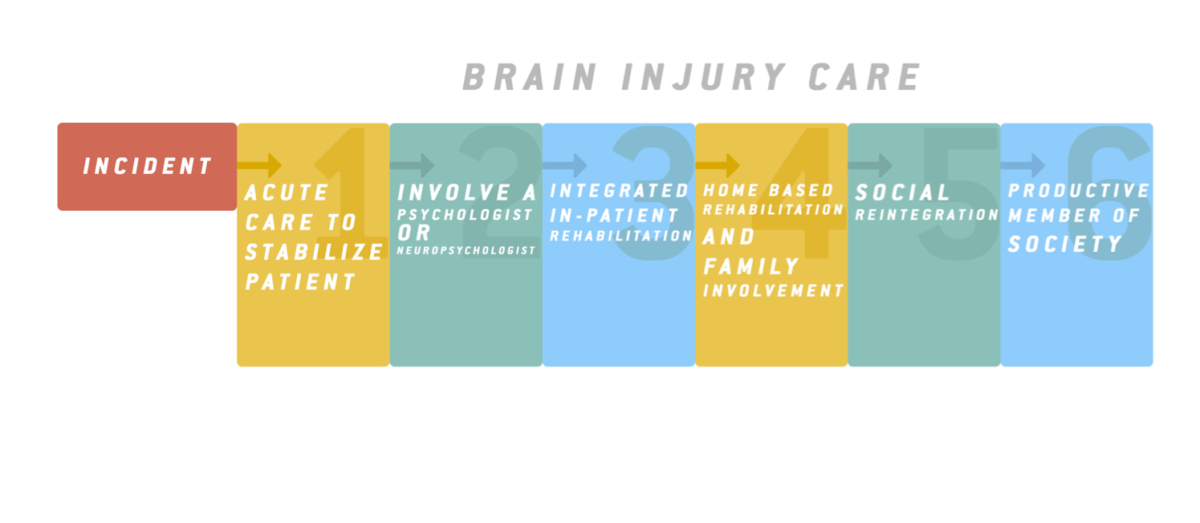Neuropsychological rehabilitation (NR) is concerned with the amelioration of cognitive, social, and emotional deficits caused by an insult to the brain. It’s the process of helping a client recover functions which are impaired due to brain damage through strategies focused on restitution, substitution, activation and integration. Rehabilitation is a methodological process of therapeutic activities generated after a thorough understanding of the individual’s deficits. The individual’s strengths are reinforced in order to compensate for impairments which are systematically improved.
Nobody expects an accident, and there is no way of being fully prepared for something like a traumatic brain injury. However, you can equip yourself with the necessary information that can possibly guide you through the scary and confusing process of dealing with an injured loved one. The brain injury care occurs in a stepwise manner.
1. Incident: This is when the person is first exposed to an insult to the brain that leads to an injury. It can be caused by a number of external (accidents, sports injury, etc.) and internal factors (stroke, tumour, etc.)
2. Acute care to stabilize the patient: The patients receive acute, short-term treatment following an injury at the hospital. The main aim of acute care is to restore the health and stability of the client.
3. Involve a psychologist or neuropsychologist: A brain injury can affect a number of neuropsychological functions like memory, attention, motor skills, social behaviours, mood changes and others, depending on the brain areas that are affected. Hence, a detailed and thorough neuropsychological evaluation is required to understand cognitive, emotional and behavioural impairments that may have resulted from the insult to the brain.
4. Integrated rehabilitation: Rehabilitation is a multidisciplinary approach where professionals like neurologist, psychiatrist, psychologist, physiotherapist, speech therapist and occupational therapist work in tandem to employ compensatory or restorative approaches for dealing with the impairments post- injury. The main goal is to provide holistic care to the client to reach an optimal level of functioning.
5. Home based rehabilitation and family involvement: Even after being discharged from the hospital, cognitive deficits may still persist. These may interfere with the individual’s ability to follow a basic routine, self-care, managing complex activities like handling finances and medications, carrying out household chores, etc. An effective rehabilitation plan can be formulated based on the changes observed and neuropsychological evaluation. The goals are formulated together by the professionals and family members with regular check ins and follow ups.
6. Social reintegration: Maintaining social life after a brain injury can be challenging. Deficits in social competence often leads to inappropriate behaviors or social withdrawal. Lack of self-esteem and confidence following the injury often acts as a hindrance to social reintegration. One of the major goals of rehabilitation is to help the individual have an optimal social life.
7. Productive member of society: Brain injury often affects an individual’s premorbid level of functioning as a member of society. An individual’s productivity at work or in social setting can be hampered. Although, neuropsychological rehabilitation can help achieve a better quality of life – something that every brain injury survivor strives for.
Neuropsychological rehabilitation can be a helpful part of a comprehensive treatment program. By promoting recovery, improving the quality of life, and fostering community reintegration, NPR ensures to be an essential resource. It can help an individual develop skills, identify strengths, find meaning and purpose and improve their overall wellbeing.
Authorship: Akshay Dixit, Community Outreach Coordinator at Synapsium

